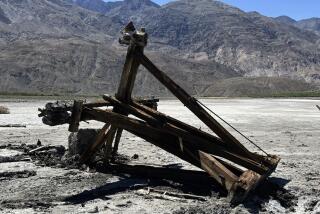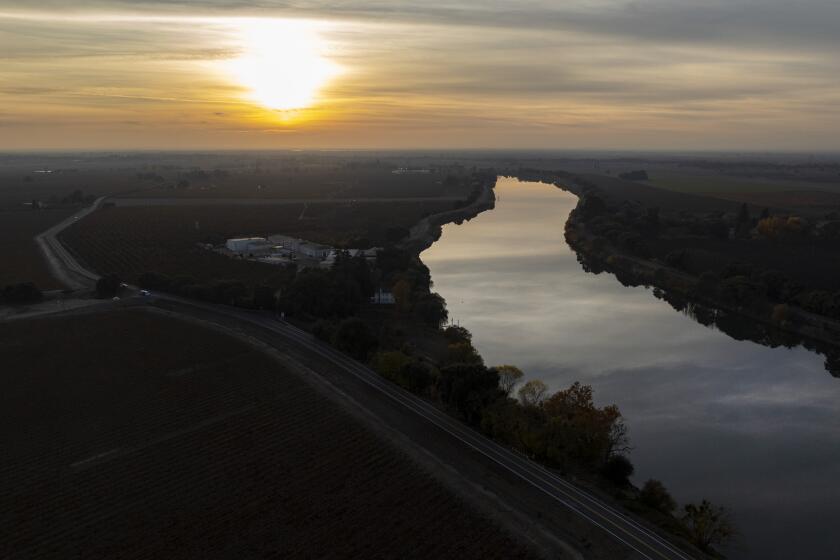AES Argues Against Limiting Power Plant Permit to 5 Years
A private power generator seeking a speedy restart of two old gas-fired units in Huntington Beach sparred Monday with energy regulators, city leaders and the community over a proposal to restrict the company’s operating permit to five years.
AES Corp. also was peppered with questions about its promise to keep the electricity it makes in California and accused by labor groups of relying too heavily on cheaper, out-of-state workers.
The issues were debated during a three-hour public hearing at Huntington Beach City Hall and remain unresolved as the project winds its way to its last hurdle: a vote of the full California Energy Commission.
A licensing panel--directed by the commission to slash the licensing process to 60 days from six months under executive orders issued by Gov. Gray Davis--has recommended that the project proceed under a variety of conditions. The Energy Commission will hear the matter April 18 in Sacramento.
AES, which is the state’s largest private power generator and already operates a pair of generators and a peaker unit in Huntington Beach, estimates it could restart two other mothballed boilers at the site by July if the fast-track permit is approved. Peaker units can produce power on a moment’s notice, but their hours of operation are limited.
With a combined output of 450 megawatts, the two 40-year-old units represent about 10% of the additional 5,000 megawatts the governor hopes to bring into service to meet an expected summer shortfall.
Debate over a proposal to give only a five-year permit for the generators took up the most time during Monday’s hearing, which was sparsely attended.
Huntington Beach officials, licensing committee members and local residents say setting a 2006 expiration date for the permit is critical and logical. They argued, among other things, that the energy outlook is expected to improve in five years. And even if it doesn’t, there are unresolved environmental questions surrounding the plant that may need to be revisited.
Paramount among community concerns are whether the AES plant is contributing to costly ocean pollution. In what is still a mystery, bacteria has been washing back to the city’s shores in the plumes so big in summer 1999 that beaches were closed almost the entire season.
AES’ Hiring Practices, State Deal Questioned
Scientists at UC Irvine have theorized that the power plant--which uses 300 million gallons of ocean water each day as coolant--might be combining with ocean currents to draw back to the shoreline sewage that is discharged miles offshore by the Orange County Sanitation District.
Jack Caswell, who is the project manager for the Energy Commission and proposed the five-year limit for the permit, defended the idea as a necessary safeguard that would open a window to address environmental liability issues.
“It’s like a timeout,” Caswell said after the hearing adjourned, forming a “T” with his hands.
Without elaborating, AES site manager Ed Blackford and Rick Rothman, a company attorney, testified that the permit limit is hampering the company’s ability to forge a sales agreement with the state Department of Water Resources, which brokers California’s power deals.
Blackford said AES will have no choice but to further press its case before the full commission during next week’s hearing.
The project’s fate could hinge on the outcome of the company’s negotiations with Water Resources, because the licensing committee and residents are seeking some kind of reassurance that AES will sell all its power to California.
Energy Commission lawyers have concluded that interstate commerce laws preclude the state from forcing power generators to keep their electricity in the state.
But city officials disagree, arguing that there have been various other cases that illustrate exceptions to the interstate rule. They filed a brief to the energy committee supporting their arguments.
“If AES is just another pirate, let’s disarm them now,” said Alvin S. Pak, special counsel for the city.
Only 10 people spoke during the public comment period that capped the hearing. Some of them stressed the need for a five-year permit limit and assurances that the power will be sold in California.
“The people of Huntington Beach won’t let their air, their water, their beaches be compromised to make electricity that won’t be used in their area anyway,” Joey Racano said.
Most of the speakers were members or representatives of labor groups who argued that it was unfair to allow AES to rely on out-of-state workers to retool the generators and pay less than the prevailing wage in Southern California.
Under a local hiring program proposed as part of the fast-track permit, 30% of the workers hired for the project are supposed to be from Orange County and 50% from somewhere in California.
But labor representatives expressed a clear distrust of AES, most notable when one of them shouted an obscenity from the back row of the gallery when Blackford suggested that the company’s current work force was all-Californian.
In direct testimony, Eric Jackson said it was not fair that someone like him, with 10,000 hours of apprentice work, could not get a good-paying job at the plant.
“I’m in favor of the powerhouse because we need the electricity,” he said. “But I’m not in favor of bringing in out-of-state workers. The state of California is losing money. Those workers are only going to be here for a short time. . . . Let’s hire the people from Southern California such as myself and my brothers and sisters from this fine community.”
(BEGIN TEXT OF INFOBOX / INFOGRAPHIC)
One More Hurdle
The plan to restart two gas-fired generators in Huntington Beach is headed for a final vote in the fast-track process by the full California Energy Commission next week in Sacramento.
More to Read
Start your day right
Sign up for Essential California for news, features and recommendations from the L.A. Times and beyond in your inbox six days a week.
You may occasionally receive promotional content from the Los Angeles Times.






